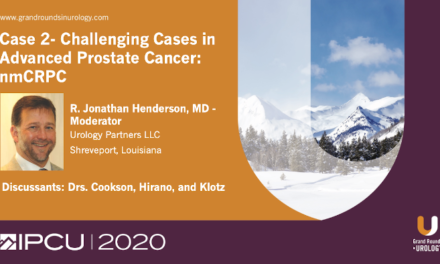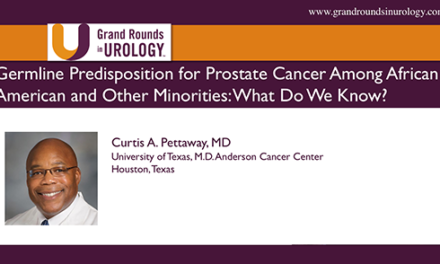James A. Eastham, MD, FACS, presented “MRI-Guided Focal Therapy: Initial Quality-of-Life and Oncologic Outcomes” during the 31st International Prostate Cancer Update in July 2021 in Snowbird, Utah.
How to cite: Eastham, James A. “MRI-Guided Focal Therapy: Initial Quality-of-Life and Oncologic Outcomes.” July 2021. Accessed Oct 2025. https://grandroundsinurology.com/mri-guided-focal-therapy-initial-quality-of-life-and-oncologic-outcomes/
MRI-Guided Focal Therapy: Initial Quality-of-Life and Oncologic Outcomes
James A. Eastham, MD, FACS, Peter T. Scardino Chair in Oncology and Chief of the Urology Service in the Department of Surgery at Memorial Sloan-Kettering Cancer Center in New York, discusses initial results from a clinical trial examining safety, quality-of-life outcomes, and oncological outcomes of MRI-targeted focal therapy for patients with intermediate-risk prostate cancer. He explains that the goal with magnetic resonance (MR)-guided focused ultrasound (MRgFUS) therapy is to try to treat as little of the prostate gland as possible and that the difficulty lies in accurately targeting the area of the prostate to be destroyed. Dr. Eastham cites the limitations of MRI and asserts the importance of finding better ways to target areas for treatment. He then explains the clinical trial methodology and its primary endpoints, which focus on the safety of the procedure, as well as its examination of quality-of-life and oncologic outcomes. Dr. Eastham describes characteristics of the patient cohort and reviews initial results indicating the procedure is safe, with no serious adverse events observed among the 101 participants. According to six-month post-procedure biopsy results, 91 percent of men had no evidence of prostate cancer in the treatment area. Comparatively, however, six-month post-procedure biopsies of the whole gland showed the procedure does not adequately target the lesions or the areas with more significant cancers; the percentage of men with no evidence of GG≥2 prostate cancer anywhere in the prostate gland dropped to 78 percent. Dr. Eastham explains that this is a failure to appropriately identify all significant lesions, despite the fact that study participants underwent two separate biopsies. While few patients have yet undergone 24-month biopsies, of those who have, only 7.3 percent had GG≥2 detected in the treatment area. Additional results show decreased PSA levels after treatment that stabilized after six months. Dr. Eastham then presents data showing that with focal ablation, men do experience some decline in erectile function. He explains that this is one reason why low-risk patients may be better suited to active surveillance. However, study participants generally did not experience a decline in urinary function. Dr. Eastham concludes by reiterating that 24-month data is forthcoming. He explains that short-term data show this is a safe, well-tolerated procedure that may enable patients to consider a tissue-preserving approach and defer or avoid radical therapy. Looking to the future and phase 3 trials, Dr. Eastham explains that a meaningful endpoint will be a delay in disease progression as well as the consequent radical prostatectomy or radiation therapy.
About The 31st Annual International Prostate Cancer Update:
The International Prostate Cancer Update (IPCU), founded in 1990, is a multi-day CME conference focused on prostate cancer treatment updates with expert, international faculty. It is led by expert physicians and is designed for urologists, medical oncologists, radiation oncologists, and other healthcare professionals involved in the diagnosis and treatment of prostate cancer. Dr. Eastham delivered this educational activity during the 31st iteration of the meeting in July 2021 in Snowbird, Utah.
ABOUT THE AUTHOR
James A. Eastham, MD, FACS, is the Peter T. Scardino Chair in Oncology and Chief of the Urology Service in the Department of Surgery at Memorial Sloan-Kettering Cancer Center in New York. Dr. Eastham received his medical degree from the University of Southern California, Los Angeles. He completed an Internship in General Surgery and a Residency in Urology at Los Angeles County+USC Medical Center. He went on to complete a Fellowship in Urologic Oncology at Baylor College of Medicine in Houston, Texas. Prior to his appointment at Memorial Sloan-Kettering Cancer Center, Dr. Eastham was an Assistant and Associate Professor in the Department of Urology at Louisiana State University in Shreveport and Chief of Urology at Overton-Brooks Veterans Administration Medical Center in Louisiana.
Dr. Eastham’s research has focused on the prevention and treatment of prostate cancer, and he has a particular interest in improving oncologic and quality-of-life outcomes after radical prostatectomy. He has authored or co-authored over 300 articles which have appeared in peer-reviewed journals such as the Journal of the American Medical Association, the Journal of Urology, the Journal of Clinical Oncology, Urology, and Transplantation. In addition, he has authored numerous book chapters, reviews, monographs, and abstracts. He is a Fellow of the American College of Surgeons and a member of several professional societies, including the American Urologic Association, the Society of Urologic Oncology, and the Societé Internationale D’Urologie.




